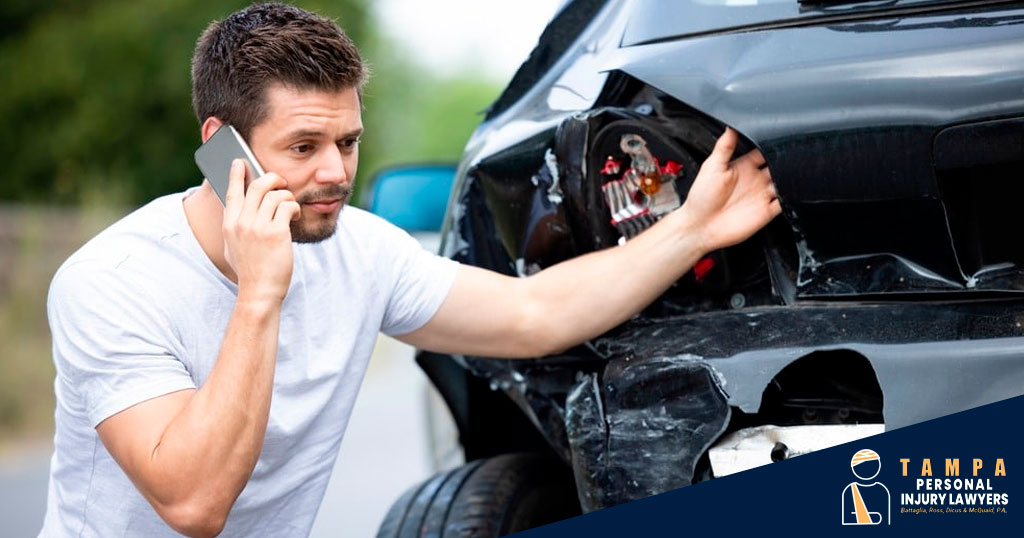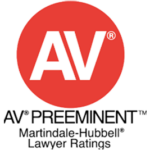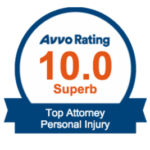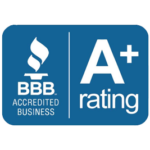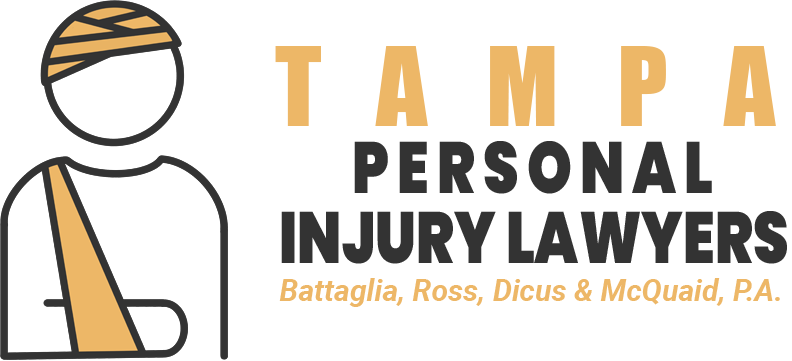If you are driving a rental car, chances are you’re traveling and driving in an unfamiliar area which can increase the likelihood of an accident. So what happens after you get into an accident in a rental car? The last thing you want is for a rental car accident to ruin your vacation or business trip. But if you know what to expect, the process can be less stressful.
First and foremost, you’re probably concerned about who is responsible for paying damages to the rental company. That will depend on what type of insurance you have and who was at fault for the crash.
It’s also possible for you to have been struck by another driver who was in a rental car. In any case, you need to be sure you understand your legal rights afterwards and what damages you may be able to recover, if any.
Table of Contents
ToggleFirst Steps to Take Immediately After a Rental Car Accident
The time right after an accident is a critical period when you must take some essential steps to ensure you protect your rights.
Call the Police or Local Law Enforcement
The first thing to do after any accident is call the police. They will come and make an official accident report which you may need as evidence to support your claim later. A police report usually includes details like who was involved in the accident, details of the accident scene, if any witnesses saw the accident, the location of the accident, and what type of vehicles were involved. You may need this for insurance purposes as well.;
Get Medical Care as Soon as Possible
If you are injured, it’s vital that you get medical attention right away. Not only will this help prevent your injury from worsening but you’ll also need documentation of medical treatment. Many injury victims don’t even realize the extent of their injuries until later. They might feel fine right after the accident but later experience worsening pain and more visible injuries, such as bruises and swelling. On top of that, the shock and adrenaline from the accident usually masks pain but once it wears off, you’ll start to feel the pain.
Try to Gather at Much Evidence as You Can at the Scene
You can never have too much evidence. Try to gather as much as you can while you’re at the accident scene. There’s a lot going on and you’re most likely in schock, but it’s very important to take as many pictures as you can. Insurance adjusters and juries, and judges rely heavily on such evidence to determine liability. You may want to get pictures of the surrounding areas, the accident scene, all vehicles involved, any injuries, and debris on the street from the accident. Also, try to take pictures from different locations so you can capture different angles of the accident scene.
Contact the Rental Car Company
If you were the one driving the rental car when the accident occured, you need to notify the company immediately. You’ll also need to notify your insurance provider. A car accident case involving a rental car is more complex than a regular car accident. You’ll want to consult with an experienced Tampa car accident lawyer who knows how to handle your unique case.
What Insurance Options Are Available After a Rental Car Accident in Tampa?
When you rent a car, you enter a contractual agreement with the rental company. If you did your due diligence and went over all the details of the paperwork, you may already know that you are obligated to return the vehicle in the same condition it was in when you rented it. It also means you are responsible for any losses or damages to the rental car. So even if someone else is at fault for the accident, you are still liable for damages. In the event of an accident during your rental period, there are several different types of insurance that may be applicable to your situation.
Another important step any car renter should take is to review the insurance options they have available throughout the rental car company. Then, compare those options to your own car insurance policy. While they often offer similar stipulations, it’s still worthwhile to check with your personal auto insurance policy beforehand to be sure about what coverage they provide when it comes to rentals. Not only that, but many rental car companies ask for proof of liability insurance if you decline their liability insurance.
Your Personal Car Insurance
All drivers in Tampa are legally required to maintain personal injury protection coverage with minimum amounts. With 15 million drivers in the state of Florida, accidents are bound to happen. The minimum requirement for auto insurance is $10,000 in personal injury protection and the same amount for property damage liability.
Personal injury protection is meant to cover medical costs and any lost wages for you and the passengers in your vehicle.
Property damage liability insurance provides coverage to pay for damages to another person’s property if you are liable. It only covers damage to the other party’s vehicle, not your own.
Additionally, most rental car companies will require you to have insurance before you rent a car. If you already have insurance, you can opt to use your own coverage, which is probably similar to the rental company’s insurance.
Be sure to check with your insurance provider before renting a car. You’ll want to clarify whether or not they will cover rental car accidents. If not, you might want to consider purchasing additional coverage through the rental car company.
Personal Accident Insurance
Personal accident insurance will provide coverage for any injuries that occured while you were driving a rental car and any passengers in the car with you. This may overlap with your personal injury protection (PIP) coverage so it might not be necessary.
The Rental Car Company’s Insurance
When you rent a car, the rental company will offer additional coverage before you get the keys to the car. It is optional coverage, but some people choose to buy it for added security and extra coverage if an accident occurs. Rental companies usually offer four types of insurance:
Loss Damage Waiver (LDW)
Rental cars companies offer a collision damage waiver. This is technically not insurance, but it does provide an additional layer of protection to the renter.
Loss damage waivers protect you in the event the rental car gets stolen or damaged. The rental car company takes on any repair or replacement costs but does not cover damage that results from negligence (e.g., reckless driving or an unauthorized driver).
Collision or loss damage waivers are optional and the renter is not obligated to purchase it. The cost will vary depending on the type of rental car and how long you’ll be driving the car to.
Personal Accident Insurance
If you opt for personal accident insurance through the rental company, it will pay for your injuries or injuries any passengers sustained.
Supplemental Liability Coverage
Rental company liability coverage will cover medical costs and property damage if another driver is at fault for the accident. It can serve as supplemental coverage to any existing auto insurance coverage that’s already available.
This coverage usually overlaps with property damage liability insurance that you have through your personal insurance for your car, so it won’t be necessary in all cases. You’ll need to check the coverage amount with your policy and see if it’s sufficient to cover all your damages if you get into an accident.
Personal Effects Coverage
Personal effects coverage is meant to cover any of your lost or damaged personal items that were in the rental car. This is usually offered with your renters or homeowners insurance policy. If you already have a homeowner’s or renter’s insurance policy, you don’t need to purchase this coverage from the rental car company.
Credit Card Rental Car Insurance
Most credit cards offer insurance for rental cars, so if you have a credit card with a major company, you probably automatically have rental insurance through the credit card company. If you use a credit card to rent a car, you may be able to use this type of coverage. For instance, the credit card company might pay for damage you are responsible for on the rental car. The caveat with credit card rental insurance is that they don’t usually include liability coverage. So you’ll want to make sure you have this through your own auto or the rental company’s insurance.
Thecoverage that credit card rental insurance does offer will vary depending on the company, but usually covers theft or any damage that occurs during the duration of your rental. Check with your credit card company to verify the specific terms of your insurance.
Credit card rental insurance is usually secondary to other insurance and only applies after all other potential sources have been exhausted. If there are no other forms of insurance available, this collision protection insurance would be the primary source for coverage.
Another factor to bear in mind is that if you did accept the damage waiver offered by the rental car company, you most likely won’t be able to use your credit card company’s rental insurance. Be sure to check your credit card terms of agreement before rushing in to sign the damage waiver. Otherwise, you could miss out on the free insurance coverage provided by your credit card company. Lastly, credit card rental coverage does have some specific exclusions such as for long-term rentals, larger vehicles, or renting for business purposes.
Contact a Tampa Rental Car Accident Lawyer
It can be confusing after a rental car accident to figure out which insurance is the right one to use. An experienced Tampa personal injury attorney can help you leverage the right policies and make sure you get the compensation you deserve. We have extensive experience and know how to effectively handle rental car companies, and insurance companies.
Call us today to speak with a knowledgeable attorney who can answer you questions and give you straightforward legal advice. We offer a free initial case review.

